A group of 23 UQ undergraduate and postgraduate students, from several disciplines, recently travelled to Indonesia to work with local communities and students from Universitas Gadjah Mada in Yogyakarta. Imogen Jones (Bachelor of Regional and Town Planning) and Jacob Brocco (Bachelor of Environmental Management) each share their highlights and outcomes of the trip, from connecting barefoot with the land to creating valuable advocacy resources.
This field trip course was coordinated by Associate Professor Sonia Roitman and Associate Professor Ron Johnstone. Nine of the UQ students received funding to attend the trip through the Australian Government’s New Colombo Plan Scholarship Program, which supports high-achieving Australian undergraduate students to study and work in the Indo-Pacific region.
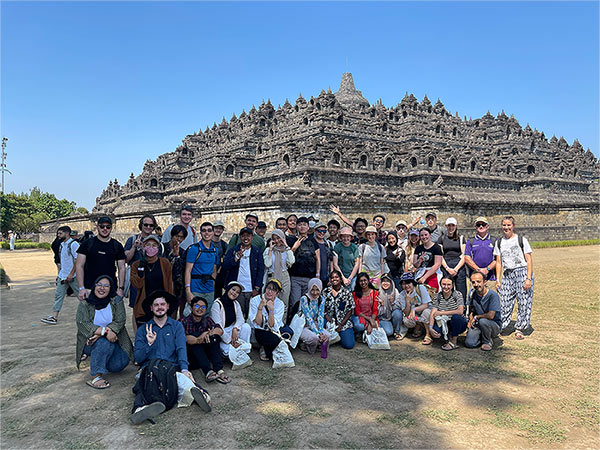
Imogen Jones: I was incredibly excited to obtain firsthand experience engaging with communities about planning-related issues. The field trip provided an opportunity to engage with a new culture in a way that was much more immersive and authentic than usual travel can provide.
The course involved our cohort of UQ undergraduate and postgraduate students [from various Schools and Faculties] forming groups with Indonesian students from the local university, Universitas Gadjah Mada (UGM). The groups then had three days of direct engagement with community members from either rural or urban contexts. The aim was to identify the most significant issues and complexities that each community faced, which differed greatly between the rural and urban sites. My group was asked to engage with the local women’s farmer group (KWT) within the rural village Ngoro-oro, Gunung Kidul, Yogyakarta province. This gave us a valuable insight into the perspectives of the women and the specific issues they face in gaining social and economic power within the community.
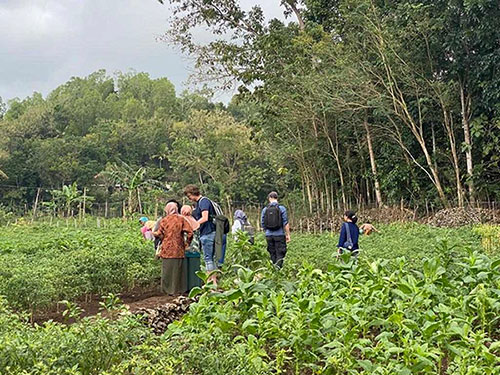
My nerves were quickly calmed as we were met with such enthusiasm and kindness from the local community, especially the KWT members. When you visit the home of an Indonesian person, or whenever you have a meal in Indonesia, you are almost guaranteed to be served a delicious glass of jasmine tea. I’m an avid tea drinker, so this also helped me feel more comfortable and welcomed!
One of the women whose homes we visited was Mrs Paniyem, who has lived in the Ngoro-oro village since she was born, in 1972. She shared stories of her life, including that when she was a little girl, her mum would wake her every Saturday at 3am to hike 30 kilometres across mountainous terrain carrying crops to sell at a faraway market. Over the time Mrs Paniyem has lived in Ngoro-oro, the main changes she has seen in the village are the introduction of electricity in 1990, and the increased accessibility to rice and clothing, which she says were very rare and special treats in her childhood. She was a fascinating person and it was an honour to talk with her.
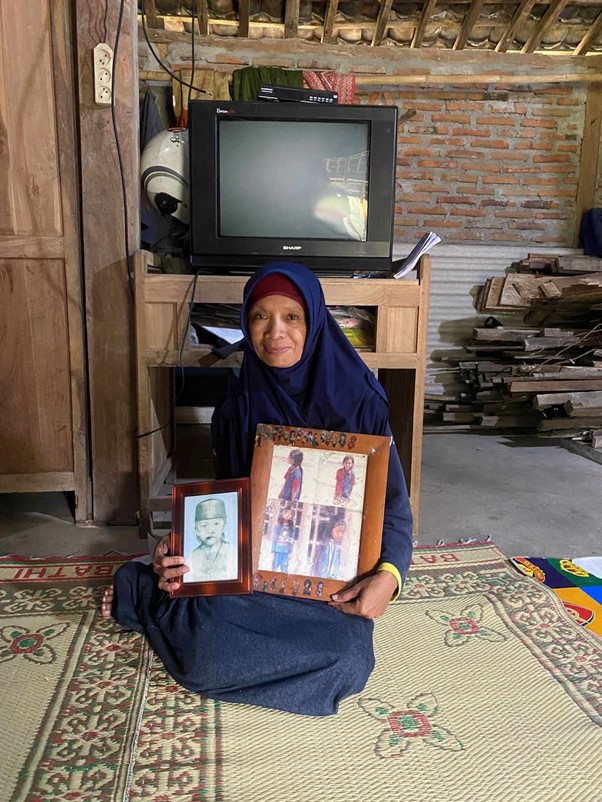
Another highlight of the trip was a tour of the farmland managed by the KWT – the women lit up with pride and joy as they showed us their produce. Before entering the farm, the women strongly insisted that we go barefoot just like them and so I, and a few others, decided to oblige. This simple act made me feel even more connected to both the women and the land in which they work. It really made me see the power that experiencing an aspect of another person’s life can have in terms of gaining a deeper understanding and perspective.
The knowledge we gained through the course allowed us to provide a clear ‘map’ of the issues faced by the communities and how these issues relate to each other. From this, we also presented suggestions for the community on different approaches they might take to help accomplish their goals and work towards mitigating the struggles they face. Importantly, these were not meant to be ‘solutions’ or ‘answers’ to their problems, but ideas that could inspire future community action. I believe the most valuable thing my group provided to the KWT was demonstrating the complexity of how their different struggles relate to each other. Once we started to connect the dots, the root source of different issues became much clearer.
Experiencing cultural differences such as communication and mindset really pushed my group to adapt to our situation, such as needing to reconstruct our engagement questions. This was the most valuable skill I took away from the course. To adapt. This kind of learning is something that can only be obtained through being exposed to new environments, new situations, new people, new cultures and new languages. Learning how to adapt when faced with challenging circumstances is a skill that helped us achieve valuable outcomes during this course, and which I’m sure will also serve us well throughout our careers.
Jacob Brocco: After years of classroom learning, I was eager to enrol in this field trip to Indonesia to gain on-the-ground experience. I am particularly interested in the complex relationship that humankind has with the earth and its natural ecosystems, and I was eager to explore this in a different developmental context. I also felt that this field trip experience could add context to the concepts covered throughout the environmental management program, especially those regarding sustainable development, environmental risk management and climate change resilience.
The course included lectures, workshops, meetings and site visits. The classroom and discussion-based learning were important for developing our contextual understanding of Yogyakarta and themes specific to the region regarding governance structures, socioeconomics, housing, risk exposure and policy aims. However, the site visits were undoubtedly the most engaging aspect of the trip. These visits consisted of tours through a variety of formal and informal kampungs (villages) within Yogyakarta City and nearby regencies. As well as adding context to the classroom learning, these trips provided insight into the heterogeneity of conditions between these settlements.
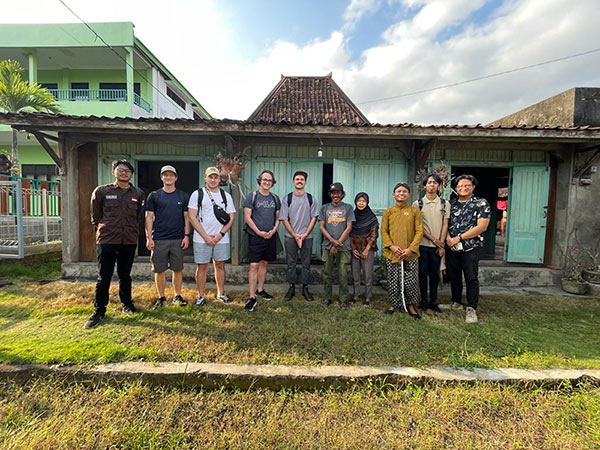
The influence of domestic/foreign aid and government funding was evident in areas that were either recently damaged by natural disasters or located in spaces that could contribute to the visual amenity of the city. Other settlements had experienced substantial development due to innovative community-led waste valorising programs that empowered the locals economically and reduced their problems with waste accumulation. Being aware of these varied conditions and outcomes became especially important when visiting our case study communities, as we were better positioned to understand what developmental possibilities existed for kampungs within the region.
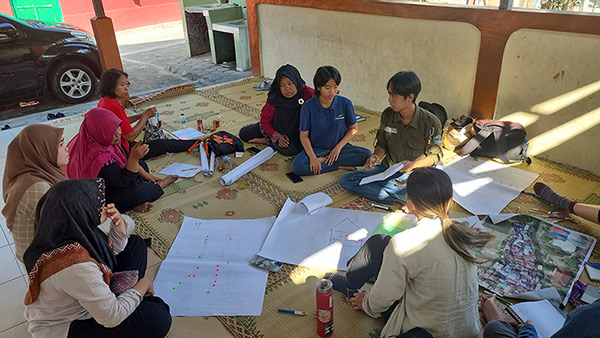
My group was assigned an urban case study in the Kampung Gowok in Sleman Regency, Yogyakarta province. The project involved collaborating with local students from Universitas Gadjah Mada (UGM) and local community-based organisation Kalijawi to engage with the community within Gowok. This included discussing the major concerns they have about their living situation. These discussions revealed that land tenure security, taxation and overcrowding of homes with multiple families and students were the drivers of issues within the community. Our collective response to these discussions was heavily informed by the invaluable insight of the community leaders and the representatives of Kalijawi who facilitated our interactions with the community. With their guidance and support we attempted to document the scale of these issues and performed oral history interviews with community members. At the conclusion of the trip, we were able to provide the community with a resource that may support their advocacy to local government for funding to expand housing capacity, or to relocate residents to nearby areas with new housing.
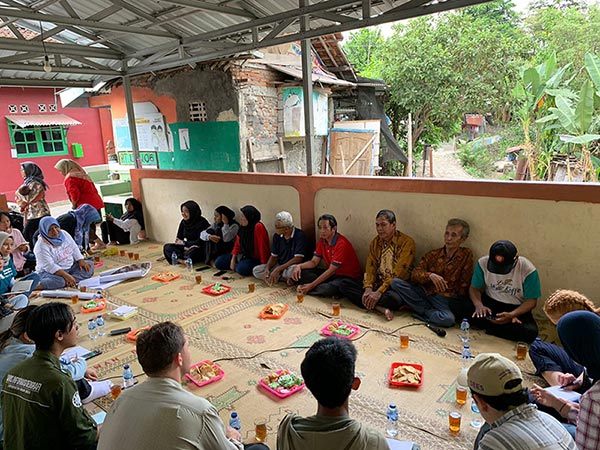
It was an immense privilege to work alongside our local partners, who displayed great patience and generosity towards our group. We established a meaningful bond with the community and our fellow students, and learnt valuable lessons about community engagement, field work and the realities – and complexities – of development in contexts different to our own.



